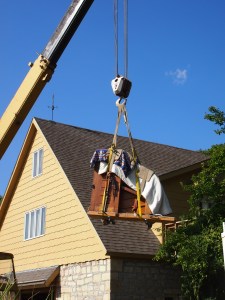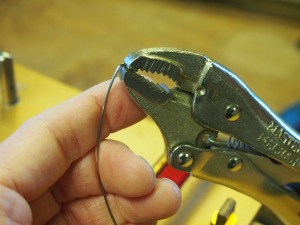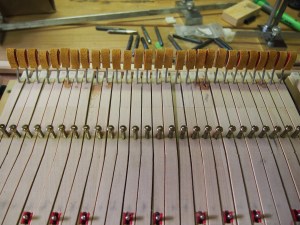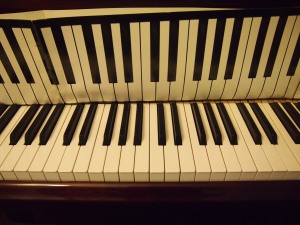A number of people have asked me about learning to tune pianos in recent months. They seem to be in one of two camps. Either they boast about how they could easily pick up the trade for some extra cash. After all, there was a tuning machine in a box of items purchased at a garage sale. That’s all you need, right? Or they ask my advice, usually prefaced with an apology, as if their desire to learn piano technology would somehow offend me with the possibility of a local competitor.
 Offend me? Never. Piano service is a lonely business. Having someone out there who is interested is an exciting prospect. I try to put them at ease. In my location, I am the only piano service technician in about four adjacent counties, possibly more. I cover quite an area. There is a need for qualified and competent technicians. I’d love to be able to give referrals when my calendar is filled. And someday, I might like to retire.
Offend me? Never. Piano service is a lonely business. Having someone out there who is interested is an exciting prospect. I try to put them at ease. In my location, I am the only piano service technician in about four adjacent counties, possibly more. I cover quite an area. There is a need for qualified and competent technicians. I’d love to be able to give referrals when my calendar is filled. And someday, I might like to retire.
 Without a doubt, there is a need for more skilled technicians. That being said, I am first in line to caution prospective students that it is no quick, easy profession to learn. It takes time—lots of it—to master the skills needed. Even if you tune a guitar or a violin, the tuning of a piano is slightly more complicated. Okay. Not slightly. A great deal more complicated. After all, there are 88 keys on a piano. Most keys strike three strings. You have somewhere in the neighborhood of 220 strings to tune in one piano. Each of those 220 strings need to be in appropriate tune with the other 219 strings. A student technician needs to be solidly committed to the process of learning. It will take an investment in a set of specialty tools. And it will take time before you even begin to feel that you know what you are doing. Lots of time. As in daily work for years. And there’s always more to learn.
Without a doubt, there is a need for more skilled technicians. That being said, I am first in line to caution prospective students that it is no quick, easy profession to learn. It takes time—lots of it—to master the skills needed. Even if you tune a guitar or a violin, the tuning of a piano is slightly more complicated. Okay. Not slightly. A great deal more complicated. After all, there are 88 keys on a piano. Most keys strike three strings. You have somewhere in the neighborhood of 220 strings to tune in one piano. Each of those 220 strings need to be in appropriate tune with the other 219 strings. A student technician needs to be solidly committed to the process of learning. It will take an investment in a set of specialty tools. And it will take time before you even begin to feel that you know what you are doing. Lots of time. As in daily work for years. And there’s always more to learn.
You can’t just be a piano tuner. The day will come when you face mechanical issues, and it won’t look good at all for you to say, “I only tune pianos. If you want this key fixed, call the other guy.” You need to be able to tune, repair broken parts, regulate actions, voice the hammers, and do it all with a smile.
It takes time to learn, during which you’ll need some other source of income, which will demand a lot of your attention also. You will wonder when you’ll be able to work on your piano skills.
 For those who manage to structure their days to allow mastery of tuning and piano repair skills, the rewards are many. You can enjoy a comfortable income, the freedom to schedule work at your preferred hours, the ability to make people happy, and endless opportunities to learn more about one of humanity’s most fascinating inventions. You can make many lifelong friends all over the world and connect with some genius minds, the leaders in today’s world of piano technology.
For those who manage to structure their days to allow mastery of tuning and piano repair skills, the rewards are many. You can enjoy a comfortable income, the freedom to schedule work at your preferred hours, the ability to make people happy, and endless opportunities to learn more about one of humanity’s most fascinating inventions. You can make many lifelong friends all over the world and connect with some genius minds, the leaders in today’s world of piano technology.
Piano tuners are often viewed as eccentric individualists, and to some extent that’s true. We’re quirky people. But we have a diverse set of skills that make us ideally suited to work in the piano service business. Some of us are stronger with one skill or another, but most of us have these traits in common. What is your aptitude for being a successful piano technician?
We tend to claim these strengths. Some of us excel in some areas and some in others, but we all tend to have these personality traits.
 While it’s not a requirement that we play at the concert level, most of us can pick out a tune on a piano. We understand basic music theory, since we work regularly with various music intervals. It is not necessary to have perfect pitch. However we have an excellent sense of relative pitch. With a pitch reference for one of the 88 keys, we tune all 220 strings.
While it’s not a requirement that we play at the concert level, most of us can pick out a tune on a piano. We understand basic music theory, since we work regularly with various music intervals. It is not necessary to have perfect pitch. However we have an excellent sense of relative pitch. With a pitch reference for one of the 88 keys, we tune all 220 strings.
 A piano has about 5000 different parts. We learn to diagnose problems with any and all parts and fix them. This requires learning skills with a variety of hand tools, power tools, and even shop tools for major repairs.
A piano has about 5000 different parts. We learn to diagnose problems with any and all parts and fix them. This requires learning skills with a variety of hand tools, power tools, and even shop tools for major repairs.
 We’re not afraid to work with our hands, or to get our hands dirty.
We’re not afraid to work with our hands, or to get our hands dirty.
 Old instruments can present lots of debris from various sources, basic dust, as well as small intruders like mice and wool moths.
Old instruments can present lots of debris from various sources, basic dust, as well as small intruders like mice and wool moths.
 We love pleasing people. After all, piano tuning and repair is a service profession, and we’re all about pleasing our employers. We rely on return business. Our customers become our friends.
We love pleasing people. After all, piano tuning and repair is a service profession, and we’re all about pleasing our employers. We rely on return business. Our customers become our friends.
 We are good financial managers. Manipulating numbers is necessary to run a successful small business. We keep records, file reports, and follow all the business laws. This can be tedious and time-consuming, but for one who is self-employed as a service professional, it is necessary. There are technicians who are employed by universities and music stores, but most field technicians are self-employed.
We are good financial managers. Manipulating numbers is necessary to run a successful small business. We keep records, file reports, and follow all the business laws. This can be tedious and time-consuming, but for one who is self-employed as a service professional, it is necessary. There are technicians who are employed by universities and music stores, but most field technicians are self-employed.
And thus we need to be self-motivated. We learn to set goals for ourselves and our business, as well as goals for our continued training and skill development. We have to be self-starters. Nobody is going to tell us to get up and go to work. Those lacking personal motivation will not get far.
Most piano owners are woefully misinformed about what they can expect from their instruments. It benefits both owner and instrument, as well as making your job more pleasant, if you can teach understanding and respect for the limits of a piano. Share your fascination with the instrument. People usually are interested.
We get really skilled about listening to a pianist’s complaints (sticking keys, action heavy, tinny treble, funny noise) and translating their words into technical terminology that will suggest a solution to the problem.
We develop critical observation skills and learn to identify the source of a problem. No matter how well-prepared we can be, though, there will come a time when a piano provides an unforeseen challenge. This is when we take stock of what we have, what will solve a problem, and arrive at an alternate working solution. What do I need? What do I have that will substitute for it?
Musical, mechanical, friendly, business-minded, self-motivated, teacher, interpreter, and problem solver. If these traits describe you, you have the aptitude to become a successful piano technician. Now all you need is the time. Good luck!










Very good article.
Thanks, Linda!
A little advice on where you learn to become a piano tuner would be helpful.
Start with the Piano Technicians Guild. http://www.ptg.org, phone 913-432-9975. The home office for the guild is in Kansas City but there are local chapters all over the country. Many experienced technicians will take on apprentices. There are a few places to enroll in a residential program, North Bennet Street school being a notable one. There are quality correspondence options, but be careful here. The Piano Technicians Guild can direct you to reputable correspondence courses.
I tell anyone asking about learning to tune, there is much more to tuning than turning a few tuning pins…. It takes years of training, experience, problem solving and there are repair techniques that are not covered in books…
I tell everyone who inquires, “Start by coming to a PTG meeting.” If they’re serious they must; If not they won’t.
There’s no better place to start than PTG, is there? And that’s how you meet the genius minds of the profession too, and make friends from all over the world. Good reply, Loren.
A good comprehensive overview and article. Yes good tuners and technicians are needed but there are just as many bad ones that shouldn’t be touching anything and still have a steady clientele. I have been working for our leading tech and rebuilder since high school, tuning since age 15 and professionally since age 17 also doing concert calibur concert tuning since age 21. It amazes me that really very few have any concept of what a finely tuned, regulated or voiced piano should sound like …..
Well said! May I share this
Of course, Dave.